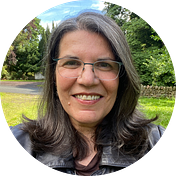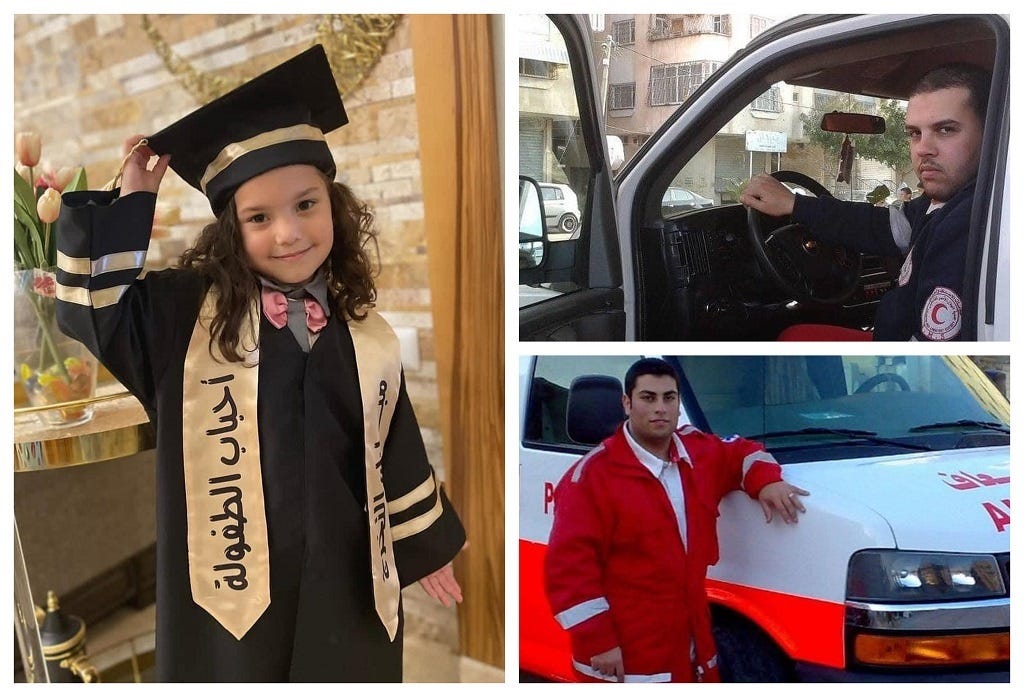Shooting First, Crying Later
Israeli soldiers seek absolution through confession after committing war crimes — excuse me if I’m not impressed
Apr 13, 2025
Hind Rajab and paramedics Yousef Zaino and Ahmed al-Maddahoun, may they rest in peace
On the 7th of April, The Guardian published the article: ‘Israel military razed Gaza perimeter land to create ‘kill zone’, soldiers say’ (The Guardian. Quique Kierszenbaum & Oliver Holmes). The report discusses soldiers’ accounts of the crimes they have committed in Gaza shared through the whistleblowing organisation Breaking the Silence. (You can read these testimonies and many others in The Perimeter: Soldiers' testimonies from the Gaza Buffer Zone 2023-2024 on the Breaking the Silence website).
The testimonies validate accounts from Gaza’s survivors, aid workers, paramedics, doctors, journalists and other witnesses, as well as what we have seen on our television screens. They reveal details behind the ferocious and relentless campaign of violence carried out by Israel, marked by deeply disturbing human behaviour. Not since the Nazi era has there been such a systematic, industrialised approach to widespread killing.
I should be impressed and relieved that soldiers and officers are prepared to stand up and admit what they did. They are, after all, whistleblowers whose testimonies contradict the official narrative emanating from Israel that our media uncritically repeat. I know that these whistleblowers pay a personal price for airing this dirty laundry. Yet the truth is that ‘Breaking the Silence’ has always left me cold. I could never shake a niggling suspicion that it serves merely as a repository, a confessional for those who have already committed unspeakable crimes and are now concerned about the state of their soul.
These soldiers and officers did what they did first, and confessed about it later. They are responsible for leaving tens of thousands of traumatised, orphaned, disabled children. They are responsible for letting newborn babies die and decompose in incubators. They remain responsible for displacing millions of people, presiding over and facilitating the wholesale hellish destruction of people’s entire reality. They are guilty of industrialised, systematic and deliberate murder, abuse, rape, torture; of murdering medics on their way to help people, and reporters who try to tell the world what they are doing. They are war criminals and they are as guilty as hell.
The Jewish faith lacks a formal confessional institution like that of the Catholic Church. Instead, atonement for sins occurs once annually on Yom Kippur (day of atonement). Yet this sacred day comes with a crucial and very wise caveat: one can only receive divine forgiveness for transgressions against God. For sins committed against fellow humans, God grants no absolution. Those seeking forgiveness must approach the very people they have wronged, because only they have the power to grant it. Even amongst secular soldiers, this principle likely resonates on some level. Yom Kippur is observed in some form or another by most Jewish Israelis. This Yom Kippur caveat—this insistence on direct accountability to those we harm—stands as one of the few principles I genuinely respect from the version of Jewish religion I absorbed growing up in Israel.
This is the story of six-year-old Hind Rajab as Munther Isaac recalls it in Christ in the Rubble:
“Come take me. Will you come and take me? I’m so scared, please come!”
These were the last words heard from six-year-old Hind Rajab in Gaza. She was trapped in a car with five of her relatives, all of them dead. Israeli shelling had forced them to flee their homes. Due to poor weather, the mother had made the difficult decision to send her daughter in the vehicle along with her aunt, uncle, and three cousins while the rest of the family fled on foot. But the Israeli military ambushed the car, and Hind was the only survivor. She managed to call an emergency line in Gaza and pleaded for more than three hours on the phone for help.
“The tank is next to me. It’s moving.”
“I’m scared of the dark, come get me.”
Twelve days later, Hind was found dead in the car with her relatives. A few meters away were the remains of another vehicle—completely burned, its engine spilling onto the ground. It was the ambulance of the Red Crescent, sent to rescue Hind. Tragically, the two crew members—Yusuf al-Zeino and Ahmed al-Madhoun—were killed when the ambulance was hit by Israeli forces. Yusuf and Ahmed sacrificed their lives trying to rescue Hind.
Hind’s story is one of many such stories. For the last year, Palestinians—and people around the world—have seen a genocide unfold before our eyes. This was not a genocide in which the horrors were discovered after the fact. No one can claim to be shocked. No one can claim not to have known—even if the full extent of this genocide is still to be determined, since thousands are still believed to be under the rubble, and since many stories remain to be told, and many investigations to be carried out. Yet, what we have witnessed is horrifying enough. The stories and images from Gaza were horror stories and images.
— Isaac, Munther. Christ in the Rubble: Faith, the Bible, and the Genocide in Gaza (p11).
No
soldier will ever receive forgiveness from six-year-old Hind, the
relatives next to whom she was murdered, or the ambulance drivers killed
on their way to rescue her. I find it unbearable to fathom what that
poor little girl felt while waiting to die, sitting in a car surrounded
by the dead bodies of the adults she looked to for protection. What did
she see, smell, hear? The killing in Gaza has been so indiscriminate
that I doubt most soldiers and officers even know whom they have
murdered. Do they ever spare a thought for their victims—what they are
feeling or thinking in their last moments?
I find a bitter
justice in the fact that their own religious tradition offers them no
forgiveness, because there is no forgiveness for this; there cannot be.
And none of this is merely historical. Other six-year-olds, children of
all ages; everyone in Gaza, continue to endure unspeakable daily horrors
unleashed upon them by soldiers who obey the orders of a government in
the service of a society determined to eliminate all the Palestinians
from historic Palestine. Israeli society has pursued Nazi war criminals
all the way to their graves. Advanced age offered them no protection
from the Mossad and the courts. Israeli society maintains a complex and
fraught relationship with guilt, forgiveness and vengeance, and its
soldiers know it.
Soldiers who testify on the Breaking the Silence platform often preface their testimonies by declaring themselves Zionists, loyal to the state of Israel. They represent typical Israeli citizens—much like I used to be—who maintain a blinkered understanding of what Zionism truly entails. Their awareness hovers just above the threshold of grasping the reality of settler-colonialism and its inherent horrors. They fail to connect their own crimes with the deadly, genocidal reality of the settler-colonial project that is Zionism.
It is therefore difficult not to view these testimonies as fundamentally self-serving. Do these war criminals genuinely feel pangs of guilt? Do they truly experience remorse? I find it hard to believe they remained ignorant of what they were doing until the moment of action. Military operations are rarely spontaneous. They are planned. Units receive briefings and intelligence to prepare them for what to expect, and what is expected of them. You can read all about it in the testimonies themselves. I’m sorry, but when you aim a sniper rifle at a child or a medic’s head and press the trigger, you know precisely what you are doing. When a tank fires at an ambulance to prevent it from reaching a little girl begging for help in a vehicle that has already been destroyed, the crew inside know what they are doing.
I regard Breaking the Silence as nothing more than a confessional booth for criminals pathetically seeking absolution, rather than a platform for those with genuine remorse who wish to make meaningful amends to their victims. They are doing it for themselves, whilst the murder machine that is the Israeli state continues its destructive rampage across historic Palestine, as well as in Lebanon, Syria and Yemen. Every one of the whistleblowers featured on Breaking the Silence was a member of the very military units that have laid waste to Gaza, killing and destroying everything and everyone in their path. All of them are ordinary Israeli citizens—fathers, husbands, brothers and cousins. They are neither mercenaries nor career soldiers.
Is it really that difficult to think before you shoot, not after? If enough soldiers refused to follow their orders, Israel would be unable to inflict the scale of devastation we have been witnessing. The extent of the destruction and harm clearly demonstrates that the majority of soldiers are more than willing to obey their orders. The testimonies faithfully recorded by Breaking the Silence will prove useful should Israel ever stand trial. But soldiers need to refuse their orders and avoid committing crimes in the first place. No victim is helped when the murderer shoots first and confesses later.
A
few months ago, I received an appeal for donations from Breaking the
Silence. I wrote back explaining that I could not support them whilst
they continue to uphold Zionism and a settler-colonial regime. Only when
they renounce Zionism will I be able to take Breaking the Silence
seriously—as a force that genuinely contributes to preventing suffering
and harm rather than as a repository for self-serving criminals seeking
absolution for crimes they should never have committed. I acknowledge
that Breaking the Silence works to persuade active soldiers to refuse
orders. Yet they fail to explain the fundamental reason why these
soldiers should refuse to participate in Israel's genocide. They do not
name Zionism as the core problem. Instead, they appeal to soldiers’
self-interest, warning them of the psychological burden they will carry
afterwards. While not entirely without merit, this approach remains
fundamentally self-serving.
As a psychotherapist, I am well aware
of the concepts of ‘perpetrator trauma’ and ‘moral injury’. Yet I
choose to stand firmly with the victims of Israel’s unfolding genocide. I
have neither time nor sympathy for the wounded feelings and belated
tears of those actively perpetrating these horrors. Some acts are so
unforgivable, that not even God will grant absolution for them, at least
according to Jewish religious tradition. By their own faith, none of
the soldiers and officers enforcing Israel’s settler-colonial nightmare
will ever be forgiven, because their victims are dead. Whether or not it
matters to them, or how much, depends on the state of their soul.

